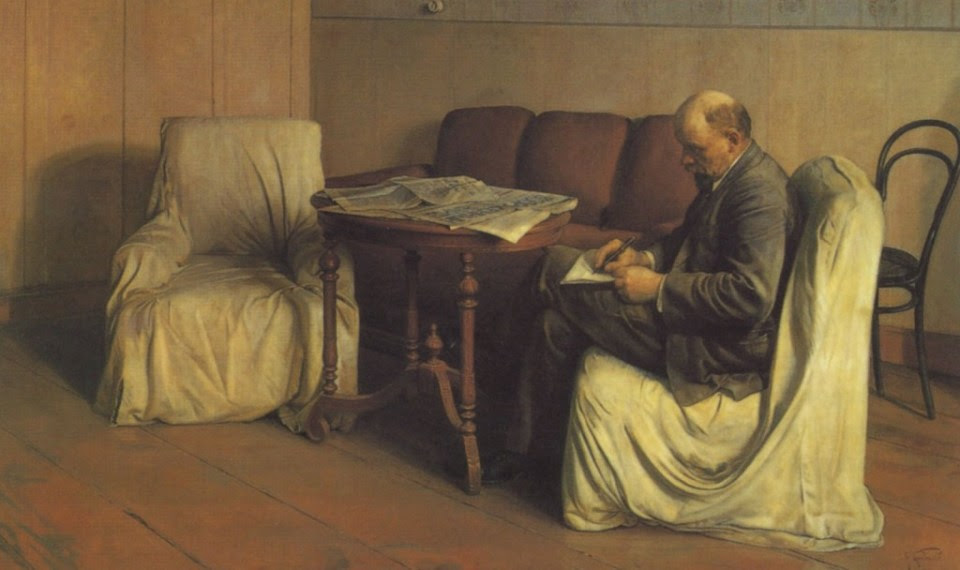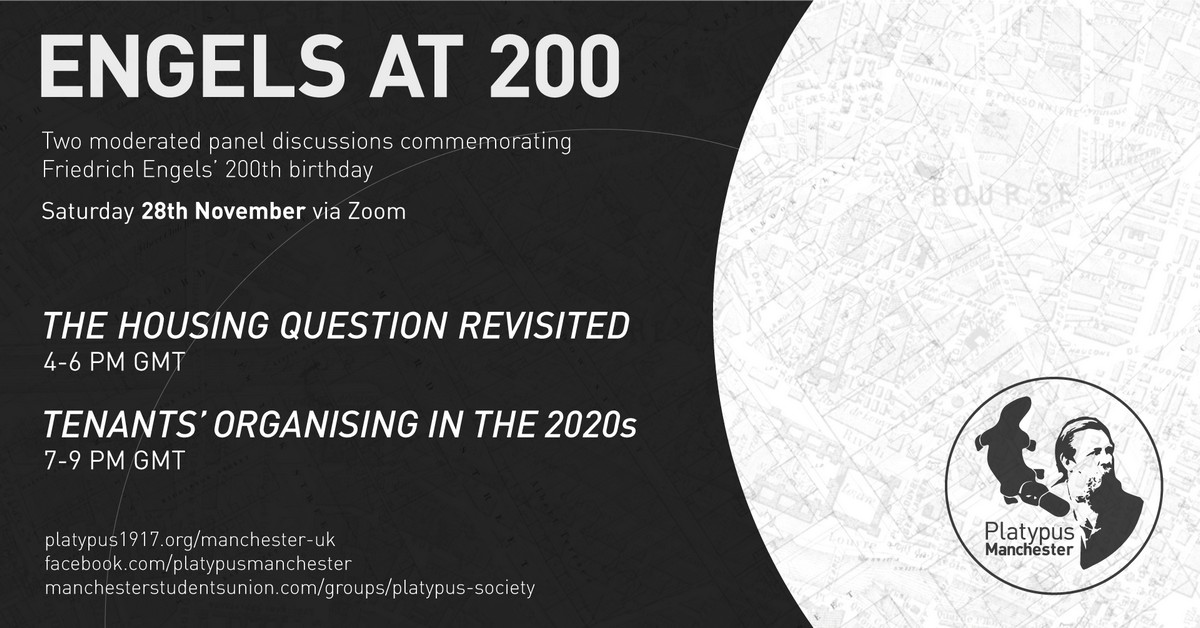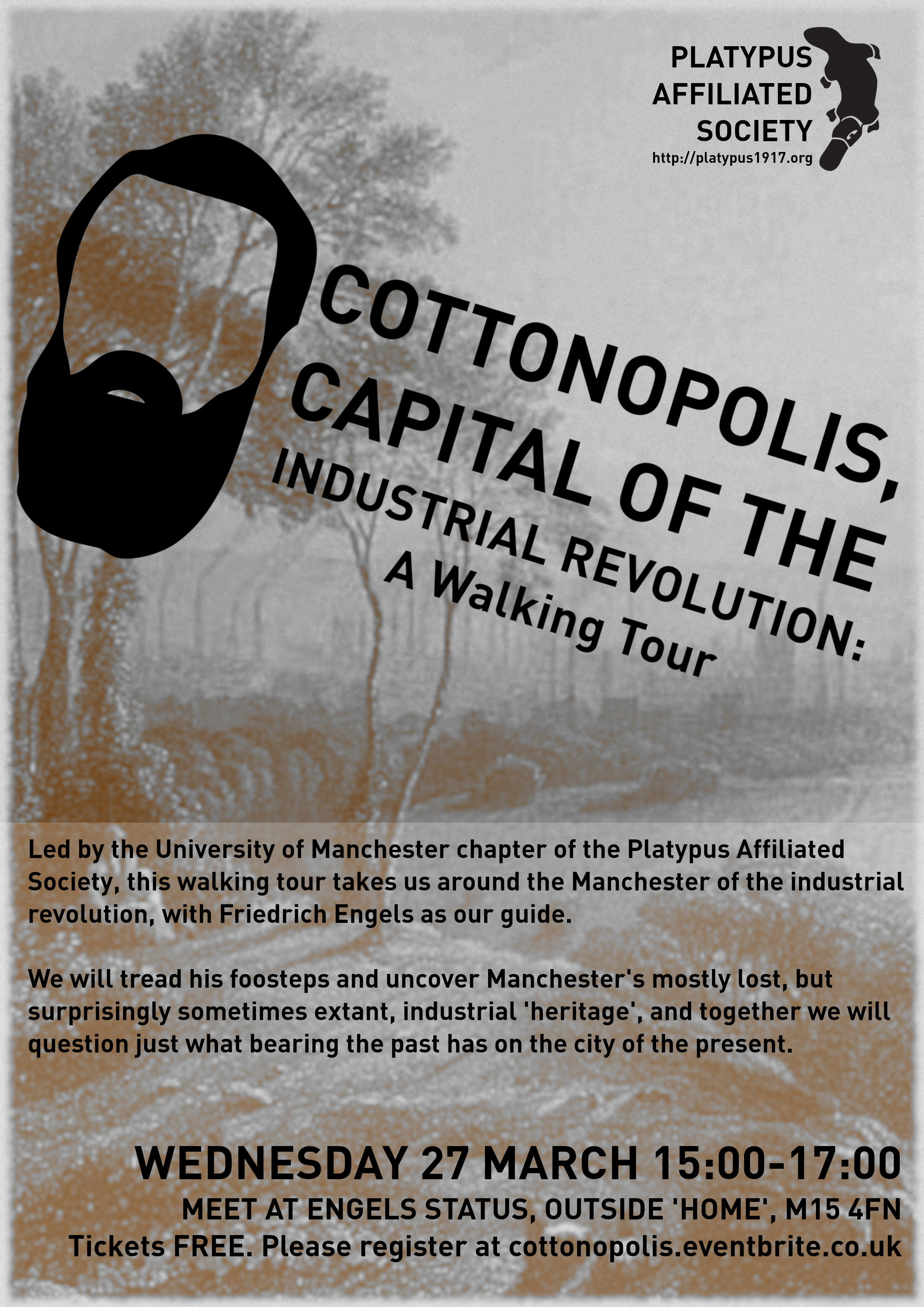
Mondays at 6pm on Zoom: https://us02web.zoom.us/j/81062045963
Facebook event: https://fb.me/e/1TRK16DKi
Everybody welcome! No prior experience required.
• required / + recommended reading
Marx and Engels readings pp. from Robert C. Tucker, ed., Marx-Engels Reader (Norton 2nd ed., 1978)
Week A. Introduction: Capital in history | Aug. 9, 2021
• Max Horkheimer, "The little man and the philosophy of freedom" (1926–31)
• epigraphs on modern history and freedom by Louis Menand (on Marx and Engels), Karl Marx, on "becoming" (from the Grundrisse, 1857–58), and Peter Preuss (on history)
+ Being and becoming (freedom in transformation) chart of terms
• Chris Cutrone, "Capital in history" (2008)
+ Capital in history timeline and chart of terms
+ video of Communist University 2011 London presentation
+ Capitalist contradiction chart of terms
• Cutrone, "The Marxist hypothesis" (2010)
• Cutrone, “Class consciousness (from a Marxist persective) today” (2012)
+ G.M. Tamas, "Telling the truth about class" [HTML] (2007)
+ Robert Pippin, "On Critical Theory" (2004)
+ Rainer Maria Rilke, "Archaic Torso of Apollo" (1908)
Week B. 1960s New Left I. Neo-Marxism | Aug. 16, 2021
• Martin Nicolaus, “The unknown Marx” (1968)
+ Commodity form chart of terms
+ Capitalist contradiction chart of terms
+ Organic composition of capital chart of terms
+ Marx on surplus-value chart of terms
• Theodor W. Adorno, “Late Capitalism or Industrial Society?” (AKA “Is Marx Obsolete?”) (1968)
• Moishe Postone, “Necessity, labor, and time” (1978)
+ Postone, “Interview: Marx after Marxism” (2008)
+ Postone, “History and helplessness: Mass mobilization and contemporary forms of anticapitalism” (2006)
+ Postone, “Theorizing the contemporary world: Brenner, Arrighi, Harvey” (2006)
Week C. 1960s New Left II: Gender and sexuality | Aug. 23, 2021
The situation of women is different from that of any other social group. This is because they are not one of a number of isolable units, but half a totality: the human species. Women are essential and irreplaceable; they cannot therefore be exploited in the same way as other social groups can. They are fundamental to the human condition, yet in their economic, social and political roles, they are marginal. It is precisely this combination — fundamental and marginal at one and the same time — that has been fatal to them.
— Juliet Mitchell, "Women: The longest revolution" (1966)
+ Capitalist contradiction chart of terms
• Juliet Mitchell, “Women: The longest revolution” (1966)
• Clara Zetkin and Vladimir Lenin, “An interview on the woman question” (1920)
• Theodor W. Adorno, “Sexual taboos and the law today” (1963)
• John D’Emilio, “Capitalism and gay identity” (1983)
Week D. 1960s New Left III. Anti-black racism in the U.S. | Aug. 30, 2021
As a social party we receive the Negro and all other races upon absolutely equal terms. We are the party of the working class, the whole working class, and we will not suffer ourselves to be divided by any specious appeal to race prejudice; and if we should be coaxed or driven from the straight road we will be lost in the wilderness and ought to perish there, for we shall no longer be a Socialist party.
— Eugene Debs, "The Negro in the class struggle" (1903)
+ Eugene Debs, "The Negro in the class struggle" (1903)
+ Debs, "The Negro and his nemesis" (1904)
+ Capitalist contradiction chart of terms
• Richard Fraser, “Two lectures on the black question in America and revolutionary integrationism” (1953)
+ Fraser, "For the materialist conception of the Negro struggle" (1955)
• James Robertson and Shirley Stoute, “For black Trotskyism” (1963)
+ Spartacist League, “Black and red: Class struggle road to Negro freedom” (1966)
+ Bayard Rustin, “The failure of black separatism” (1970)
• Adolph Reed, “Black particularity reconsidered” (1979)
+ Reed, “Paths to Critical Theory” (1984)
Week E. Frankfurt School precursors | Sept. 6, 2021
+ Capitalist contradiction chart of terms
• Wilhelm Reich, “Ideology as material power” (1933/46)
• Siegfried Kracauer, “The mass ornament” (1927)
+ Kracauer, “Photography” (1927)
+ Being and becoming (freedom in transformation) / immanent dialectical critique chart of terms
Week F. Radical bourgeois philosophy I. Rousseau: Crossroads of society | Sep. 13, 2021
To be radical is to go to the root of the matter. For man, however, the root is man himself.
— Marx, Critique of Hegel’s Philosophy of Right (1843)Whoever dares undertake to establish a people’s institutions must feel himself capable of changing, as it were, human nature, of transforming each individual, who by himself is a complete and solitary whole, into a part of a larger whole, from which, in a sense, the individual receives his life and his being, of substituting a limited and mental existence for the physical and independent existence. He has to take from man his own powers, and give him in exchange alien powers which he cannot employ without the help of other men.
— Jean-Jacques Rousseau, On the Social Contract (1762)
• Max Horkheimer, "The little man and the philosophy of freedom" (1926–31)
• epigraphs on modern history and freedom by James Miller (on Jean-Jacques Rousseau), Louis Menand (on Marx and Engels), Karl Marx, on "becoming" (from the Grundrisse, 1857–58), and Peter Preuss (on history)
+ Rainer Maria Rilke, "Archaic Torso of Apollo" (1908)
+ Robert Pippin, "On Critical Theory" (2004)
+ Being and becoming (freedom in transformation) chart of terms
• Jean-Jacques Rousseau, Discourse on the Origin of Inequality (1754) PDFs of preferred translation (5 parts): [1] [2] [3] [4] [5]
+ Capital in history timeline and chart of terms
• Rousseau, selection from On the Social Contract (1762)
Week G. Radical bourgeois philosophy II. Adam Smith: On the wealth of nations (part 1) | Sep. 20, 2021
• Adam Smith, selections from The Wealth of Nations
Volume I [PDF]
Introduction and Plan of the Work
Book I: Of the Causes of Improvement…
I.1. Of the Division of Labor
I.2. Of the Principle which gives Occasion to the Division of Labour
I.3. That the Division of Labour is Limited by the Extent of the Market
I.4. Of the Origin and Use of Money
I.5 Of the Real and Nominal Price of Commodities
I.6. Of the Component Parts of the Price of Commodities
I.7. Of the Natural and Market Price of Commodities
I.8. Of the Wages of Labour
I.9. Of the Profits of Stock
Book III: Of the different Progress of Opulence in different Nations
III.1. Of the Natural Progress of Opulence
III.2. Of the Discouragement of Agriculture in the Ancient State of Europe after the Fall of the Roman Empire
III.3. Of the Rise and Progress of Cities and Towns, after the Fall of the Roman Empire
III.4. How the Commerce of the Towns Contributed to the Improvement of the Country
Week H. Radical bourgeois philosophy III. Adam Smith: On the wealth of nations (part 2) | Sep. 27, 2021
• Smith, selections from The Wealth of Nations
Volume II [PDF]
IV.7, Of Colonies
V.1. Of the Expences of the Sovereign or Commonwealth Article 2d and 3d and Part IV
Week I. Radical bourgeois philosophy IV. What is the Third Estate? | Oct. 4, 2021
• Abbé Emmanuel Joseph Sieyès, What is the Third Estate? (1789) [full text]
+ Bernard Mandeville, The Fable of the Bees (1732)
Week J. Radical bourgeois philosophy V. Kant and Constant: Bourgeois society | Oct. 11, 2021
• Immanuel Kant, "Idea for a universal history from a cosmopolitan point of view" and "What is Enlightenment?" (1784)
+ Being and becoming (freedom in transformation) chart of terms
+ Kant's 3 Critiques [PNG] and philosophy [PNG] charts of terms
• Benjamin Constant, "The liberty of the ancients compared with that of the moderns" (1819)
+ Jean-Jacques Rousseau, Discourse on the origin of inequality (1754)
+ Rousseau, selection from On the social contract (1762)
Week K. Radical bourgeois philosophy VI. Hegel: Freedom in history | Oct. 18, 2021
• G.W.F. Hegel, Introduction to the Philosophy of History (1831) [HTML] [PDF pp. 14-128] [Audiobook]
+ Being and becoming (freedom in transformation) chart of terms
 On 28 November 2020 Platypus Manchester hosted two moderated panel discussion commemorating the date of Friedrich Engels' 200th birthday. Primarily Manchester-based speakers reflected on 200 years of struggle for good housing, and the present moment of housing politics. The discussions included separate sessions of audience Q&A.
On 28 November 2020 Platypus Manchester hosted two moderated panel discussion commemorating the date of Friedrich Engels' 200th birthday. Primarily Manchester-based speakers reflected on 200 years of struggle for good housing, and the present moment of housing politics. The discussions included separate sessions of audience Q&A.
Audio:
https://archive.org/details/engels-at-200-the-housing-question-revisited
https://archive.org/details/engels-at-200-tenants-organising-in-the-2020s
Video
https://fb.watch/2nlxlgBAeF/
https://fb.watch/2nlyYSxgDI/
Facebook event: https://www.facebook.com/events/195543865502986
4-6pm: The Housing Question Revisited
- Dr Stuart Hodkinson (Critical Urban Geography - University of Leeds)
- Lucy Nichols (Counterfire; 9K4WHAT?)
- Sam Holden (Architecture - University of Manchester)
7-9pm: Tenants’ Organising in the 2020s
- Isaac Rose (Greater Manchester Housing Action)
- Dr Quintin Bradley (Planning and Housing - Leeds Beckett University)
- Imogen Woods (Prometheus Journal)
4-6pm GMT: The Housing Question revisited
Friedrich Engels’ ‘The Condition of the Working Class in England’ documented the impoverished condition of urban housing and of working-class life in Manchester in 1844, a moment of rapid industrialisation and urbanisation. Following these observations and many more, Engels in 1872 wrote ‘The Housing Question’, a polemic directed at both anarchists and liberal social reformism. In the critique of social reformist urban planning approaches to working class housing, Engels understood the slum clearance schemes of his time as simply a geographical displacement of the problem of capitalism.
Like the 1840s, recent decades have seen economic recession, political turmoil and huge increases in the value of land and rent. It also appears that there is a return to the tenure split of the 19th Century, when private renting was the dominant form of tenure.
The critique of housing and urbanisation expresses contradictions inherent to capitalism. On the occasion of Engels’ 200th birthday, we ask:
- What do lessons of the past hold for present-day struggles for good housing?
- What would Engels think of the situation of housing and urbanisation in 2020?
- What does the housing question mean for the Left today?
7-9pm GMT: Tenants’ organising in the 2020s
In recent years, housing has again returned to become a focus for organising, and several new efforts at organising tenants have emerged on the Left. This comes at a moment of failure for Corbynism and neo-social-democratic politics. It appears that this may be a transitional moment for the Left, implicating a shift in political strategy away from a policy orientation, and towards community organising. Furthermore, the pandemic response has foregrounded the importance of adequate housing and has heightened attempts to build solidarity at the grassroots level.
At this moment of resurgent tenants’ organising, this panel discussion asks:
- How does organising tenants’ unions relate to renewing revolutionary politics and the task of overcoming capitalism?
Led by the University of Manchester Platypus Society, this walking tour takes us around the Manchester of the industrial revolution, with Friedrich Engels as our guide.
We will tread his footsteps and uncover Manchester's mostly lost, but surprisingly sometimes extant, industrial 'heritage', and together we will question just what bearing the past has on the city of the present.
Meet at the Engels statue outside HOME (M15 4FN) no later than 3pm. Walk followed by drinks.
All welcome, tickets free but please book beforehand via Eventbrite: cottonopolis.eventbrite.co.uk
FB event: facebook.com/events/498087800724617/
Venue/Timing
Venue: Start: Engels Statue outside HOME
Type: Meeting, Other, Social, Society, Travel or Trips
Start Date: Wednesday 27-03-2019 - 15:00
End Date: Wednesday 27-03-2019 - 17:00
Capacity: 25
Location
Latitude: 53.4737421
Longitude: -2.2463890999999876
Contact Details
london@platypus1917.org


